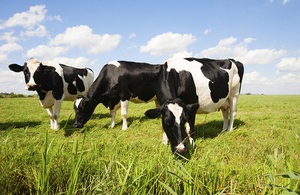CMA provisionally clears rendering merger
The CMA has provisionally cleared Linergy’s completed acquisition of Ulster Farm By-Products.

Cows in a field
Linergy Limited (Linergy) and Ulster Farm By-Products Limited (UFBP) process animal by-products and fallen stock through rendering plants located in Northern Ireland. Customers who use rendering services include slaughter houses, deboning plants, other food processors, retailers such as butchers and purchasers of outputs from the rendering process (tallow and meat and bone meal).
The companies own different categories of rendering plant, operating in different markets, and so the inquiry group of Competition and Markets Authority (CMA) members looking at the merger has provisionally concluded that it has not resulted, and may not be expected to result, in a substantial lessening of competition.
The group also considered whether a memorandum of understanding (MoU) previously signed between the companies in 2012 had influenced their subsequent strategic decisions.
In particular, it considered whether the intention to merge indicated in the MoU had led the companies to make different decisions over respectively closing and (potentially) opening rendering plants than they would have done in its absence. In both cases, these plants would have competed with one owned by the other company.
The group has provisionally concluded that the economic and commercial incentives around both decisions would have led to the same outcome in each case, irrespective of the MoU.
The group has also looked at whether Linergy’s part ownership by meat processing companies could lead it to use its acquisition of the UFBP plant to disadvantage competing meat processing customers - by raising prices for rendering services or refusing to process their material at all. The group has provisionally found that customers would still have alternative renderers to go to, that there would also be options other than rendering for customers, and in any case that Linergy’s shareholders would not benefit significantly from such a tactic making them unlikely to attempt it.
Phil Evans, Inquiry Chair said:
We’ve looked closely at all aspects of this merger. In particular we analysed key investment and commercial decisions made by the companies in the past and the effect they might have on customers in future.
Our provisional view is that these key decisions were driven by commercial considerations in relation to the individual plants and would have been taken regardless.
From our analysis of the case, it also appears that fears the companies might leverage the merger to shut out competing meat processors from other markets are unfounded. In the main, rendering customers have other options and any attempt to exclude customers would see the companies foregoing definite income for small and uncertain gains.
Our provisional view is this merger will not substantially reduce competition or damage customer interests in the rendering or meat processing markets in Northern Ireland. We will now consider responses before reaching our final decision.
The merger was referred for an in-depth phase 2 investigation on 28 July 2015. The full provisional findings report is now available on the inquiry case page along with all other published information relating to the inquiry. The inquiry group must publish its final report by 11 January 2016.
Anyone wishing to respond to the provisional findings should do so in writing, by no later than 5pm on 10 December 2015. Please email linergy.ulsterfarm@cma.gsi.gov.uk or write to:
Project manager
Linergy/Ulster Farm merger inquiry
Competition and Markets Authority
Victoria House
Southampton Row
London
WC1B 4AD
Notes for editors
- The CMA is the UK’s primary competition and consumer authority. It is an independent non-ministerial government department with responsibility for carrying out investigations into mergers, markets and the regulated industries and enforcing competition and consumer law.
- The phrase ‘animal by-products’ refers to what remains of an animal after meat and offal for human consumption, and other uses, has been removed. The phrase ‘fallen stock’ refers to animals that have died on farms.
- Linergy and UFBP had plans to merge in 2011/12. However, in March 2012, following the decision of the Office of Fair Trading to refer that merger to the Competition Commission for an in-depth phase 2 investigation, Linergy and UFBP abandoned their merger plans. Shortly after the merger was abandoned, SAPI SpA (SAPI) acquired UFBP and entered into an MoU with Linergy. On 14 May 2015, Linergy acquired UFBP from SAPI, and SAPI acquired 30% of the combined Linergy/UFBP.
- The UK merger control regime has 2 phases. Where a merger is referred to phase 2, the CMA must decide, on the balance of probabilities, whether the merger has resulted, or may be expected to result, in a substantial lessening of competition.
- All the CMA’s functions in phase 2 merger inquiries are performed by inquiry groups chosen from the CMA’s panel members. The appointed inquiry group are the decision-makers on phase 2 inquiries. The CMA’s panel members come from a variety of backgrounds, including economics, law, accountancy and/or business. The membership of an inquiry group usually reflects a mix of expertise and experience (including industry experience).
- The inquiry group of CMA panel members is: Phil Evans (Inquiry Chair), Ros Hedley-Miller, Michael Hutchings and Tim Tutton.
- The inquiry group may extend the 24-week period within which it is required to publish its report by no more than 8 weeks if it considers that there are special reasons why the report cannot be published within that period.
- Enquiries should be directed to Rory Taylor (rory.taylor@cma.gsi.gov.uk, 020 3738 6798).
- For information on the CMA see our homepage, or follow us on Twitter @CMAgovuk, Flickr and LinkedIn. Sign up to our email alerts to receive updates on merger cases.